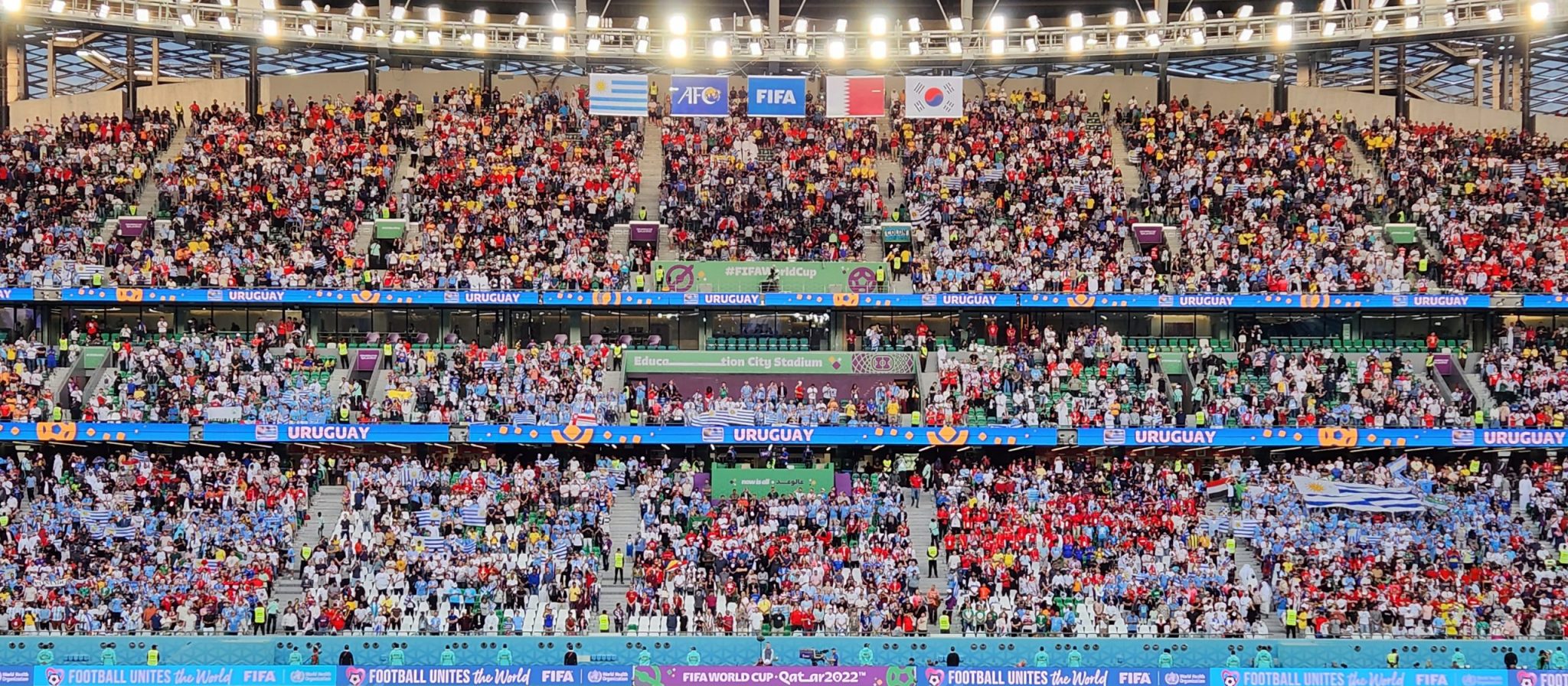Can we afford to look away?
The 2022 World Cup kicked off in a stadium shaped like a Bedouin tent. This provided American actor Morgan Freeman’s speech at the opening ceremony with an easy metaphor. ‘We gather here as one big tribe and Earth is the tent we all live in’, he said, followed by some universalist message about how football unites people and nations in their love of the beautiful game and how ‘this land has a story of its very own’. Beyond the platitudes, this comment about the land was very telling. It’s part of the doctrine crafted by the Qatari state (seemingly impervious to the public relations horror that its World Cup has turned into) which insists on distinguishing itself from European culture.
The camels and tents of the opening ceremony were there to support the claim that visitors to Qatar should respect local values: an explanation for why rainbow flags are confiscated at the stadiums and no criticism of the nation’s human rights record is tolerated. In these early days of the World Cup, the imagery coming out of Qatar seemed familiar to me. I grew up in Tel Aviv, a city founded by Jewish migrants to British Palestine, which legend has it was ‘born from the sands’ of the beach it sits along. It’s a good story to tell if you want to look away from the Palestinian villages that used to be there. Stories like these enforce a politics of obfuscation, where criticism is framed as cultural misunderstanding.
I didn’t actually watch Freeman live. In the UK, the BBC opted not to play the opening ceremony of the World Cup, disregarding the fanfare, the pyrotechnics, the performance by Jungkook from BTS, the cameras panning across local dignitaries and blank-faced FIFA officials. Instead, I watched BBC pundits discuss the reasons they still, on the opening day, felt hesitant about this World Cup taking place in Qatar. (Journalists have been wondering how to talk about this World Cup for years.)
What does such commentary at this hour actually achieve? Listening to sports pundits debate the labour conditions of migrant workers in Qatar, the situation for women in the country, and how LGBTQ+ people are persecuted there – in the knowledge that the opening ceremony was already under way – felt genuinely disempowering.
What is left to do? You could try a boycott. After all, choosing not to watch is the most direct and simple form of refusal – football has gained a huge amount of its capital and influence through television rights alone. But a lot of fans, myself included, found it hard to tear themselves away.
As I’ve kept watching the tournament, I’ve found myself searching instead for symbols of resistance, something that would make these concerns visible: a flash of a rainbow flag that made its way into the stadium, for instance, or a footballer wearing a ‘one love’ armband in defiance of FIFA’s ruling (I wondered how powerful a photograph of a referee brandishing a yellow card to a captain for wearing a rainbow armband might prove, but the moment never happened).
This is the World Cup, where every aspect of the televised game is monetised and, as FIFA is demonstrating, cannot be shaken. Many teams, unwilling to risk any punishment that might dent their chances at glory, were relegated to small gestures: the Danes described their kit colour as ‘funerary black’; in a team photo, the German players covered their mouths with their hands to signal they had been ‘silenced’.
Meanwhile, there were many photographs online on the opening day of a massive traffic jam on the long, desolate road leading to the Al-Bayt stadium. The organizers set up huge parking lots and encouraged fans to drive to the stadium, newly built and unserved by public transit. If the image of Qatar that is constantly projected to the West is of a gleaming, ever-developing peninsula with a twinkling sea and shiny high rises (a narrative of wealth that would surely be crowned by the arrival of the World Cup), then this dusty, long desert road to the sparkling stadium felt a little on the nose (though perhaps a four-hour traffic jam is rather fitting for an oil-rich region).
Qatar had to build all but one of the stadiums in time for this World Cup, and they feel notably impermanent: there are plans to give away the seats from most of them to football teams in the Global South; Stadium 974 is made up of shipping containers that will then be repurposed; the tent-like Al Bayt stadium will be reconfigured to cut its capacity in half. It all would make this tournament seem like a blip, if you didn’t recall the thousands of migrant workers who died building such semi-temporary structures.
Among a series of bizarre pre-tournament remarks, FIFA president Gianni Infantino asked that we all put politics aside for a month and ‘let football take the stage’. Meanwhile, in an empty stadium thousands of miles away from Qatar, the English Football Association lit the arches of Wembley in rainbow colours, as if criticism can be exported, held where it is more convenient.
But at the tournament itself, the Iranian players remained silent while the anthem of the Islamic Republic was played before their first game (against England), a gesture of mutiny reminding us that politics happen everywhere we are. Attempts to displace the politics of the game is a doomed endeavour. The missing rainbow colours, those dusty roads, the temporary stadiums and the endless conversations about when not to watch – in all of this, politics has crashed head on with the behemothic industry of football. You can choose to watch or boycott the spectacle, but the politics of the game can be felt everywhere, a reminder that international football is only ever a stage for our anxieties and concerns.
